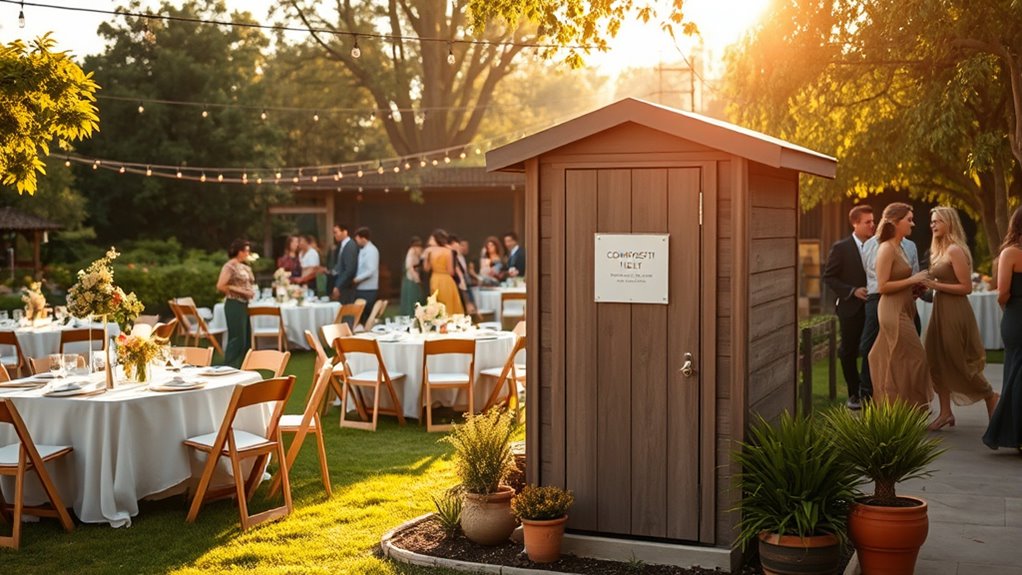In a green wedding, incorporating eco-friendly sanitation options like composting toilets and biodegradable wipes helps you reduce water use and minimize waste. Composting toilets are easy to set up outdoors or at temporary venues, turning waste into safe compost. Using biodegradable wipes instead of synthetic materials also cuts down plastic waste. Educating your guests about these choices reinforces your sustainability message, and partnering with eco-conscious vendors makes it simple to implement these solutions. Keep exploring to discover more ways to make your wedding greener.
Key Takeaways
- Incorporate composting toilets to reduce water use and promote sustainability at outdoor or temporary wedding venues.
- Educate guests on eco-friendly sanitation options like biodegradable wipes to minimize plastic waste.
- Collaborate with eco-conscious vendors to ensure all sanitation products and setups align with green wedding goals.
- Highlight eco-friendly sanitation choices in wedding materials to raise awareness and encourage responsible waste disposal.
- Use portable composting systems as a sustainable alternative to traditional sewage connections, reinforcing environmental commitment.

As concerns about environmental impact grow, exploring eco-friendly sanitation options becomes more important than ever. When planning a green wedding, every detail counts, including how you handle sanitation. Traditional toilets consume a lot of water and often rely on systems that can harm the environment. Instead, you might consider installing composting toilets, which use little to no water and turn waste into compost that can be safely returned to the earth. These systems are easy to set up outdoors or in temporary venues, making them ideal for eco-conscious celebrations. They also eliminate the need for sewage connections, reducing overall environmental footprint. Using composting toilets sends a clear message that your wedding aligns with sustainable values, encouraging guests to think about their own environmental impact.
Another simple yet effective step is switching to biodegradable wipes instead of conventional toilet paper or wipes with synthetic materials. Biodegradable wipes break down naturally, reducing plastic waste in landfills and waterways. They’re gentle on the skin and just as convenient, making them a practical choice for eco-friendly weddings. When you provide biodegradable wipes at your venue, you’re promoting responsible waste disposal and helping prevent non-biodegradable waste from accumulating. Educating guests about the benefits of these wipes can foster a sense of shared responsibility, inspiring them to adopt greener habits beyond your wedding day.
Incorporating these sanitation options goes beyond just choosing the right equipment; it involves educating your guests about their importance. You can include information about composting toilets and biodegradable wipes on your wedding website or in welcome packets. This not only raises awareness but also encourages guests to participate actively in your sustainability efforts. Additionally, you might work with vendors experienced in eco-friendly setups to ensure that every aspect of your event aligns with your green goals. From portable composting toilets to eco-conscious cleaning supplies, every detail reinforces your commitment to minimizing environmental harm.
Ultimately, adopting eco-friendly sanitation options like composting toilets and biodegradable wipes demonstrates your dedication to sustainability. It’s an impactful way to reduce water and waste, set an example for your guests, and celebrate your union with a clear conscience. When every choice reflects your values, your wedding becomes more than just a special day — it becomes a statement about caring for the planet. By making these thoughtful decisions, you help build a greener future, one celebration at a time.
Frequently Asked Questions
How Do Eco-Friendly Sanitation Options Compare in Cost to Traditional Ones?
When considering eco-friendly sanitation options versus traditional ones, you might wonder about the cost comparison. Generally, eco-friendly choices can be more affordable upfront, especially with innovative, sustainable products. However, budget considerations vary based on scale and specific needs. While some eco options save money long-term through reduced water and waste management expenses, others may require higher initial investments. Weighing these factors helps you make an informed decision that aligns with your budget goals.
Are There Any Health Risks Associated With Eco-Friendly Sanitation Alternatives?
Think of eco-friendly sanitation options as the modern-day equivalent of the Garden of Eden—appealing but requiring careful consideration. You might worry about health safety and maintaining sanitary standards, but generally, these alternatives are safe when properly managed. As long as you follow guidelines and ensure regular maintenance, eco-friendly options pose minimal health risks. Embracing sustainable sanitation doesn’t mean sacrificing safety; it’s about smarter, greener choices for your event.
Can Eco-Friendly Sanitation Options Accommodate Large Wedding Guest Counts?
You wonder if eco-friendly sanitation options can handle large wedding guest capacities. With proper sanitation design, these systems are scalable and can accommodate high guest counts. By selecting modular or high-capacity eco-friendly units, you guarantee guest comfort and health while maintaining sustainability. Planning ahead and consulting providers helps you choose the right setup, making eco-friendly sanitation a practical solution even for big weddings.
What Maintenance Is Required for Eco-Friendly Sanitation Facilities?
You’ll need to regularly inspect and clean eco-friendly sanitation facilities to guarantee proper waste disposal and hygiene. Maintenance involves emptying waste tanks, cleaning surfaces with eco-friendly products, and checking for any plumbing issues. Follow specific cleaning procedures recommended by the manufacturer to prevent odors and malfunctions. By staying proactive with these tasks, you help preserve the environment and keep your guests comfortable throughout the event.
Are Eco-Friendly Sanitation Options Suitable for Outdoor and Rustic Venues?
Think outdoor and rustic venues are too rough for eco-friendly sanitation? Think again. Portable solutions fit perfectly in these settings, offering flexibility without sacrificing aesthetics. You can choose sleek, eco-conscious units that blend into natural surroundings, making them suitable for any venue. These options provide eco-friendly benefits while meeting aesthetic considerations, ensuring your event stays beautiful and sustainable without compromising comfort or style.
Conclusion
Just as Mother Earth offers us her bounty, embracing eco-friendly sanitation at your wedding honors her generosity. By choosing sustainable options, you become part of a larger story—one that echoes the timeless wisdom of tending the land with care. Remember, small choices ripple outward, shaping a greener future. So, celebrate your special day knowing you’re leaving a positive legacy, much like the hero who restores balance to a world in need.









